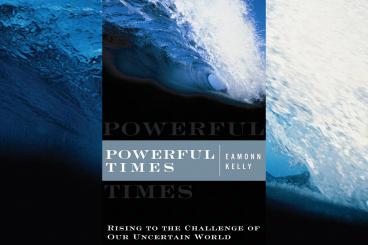The end of the beginning - PowerPoint PPT Presentation
1 / 38
Title:
The end of the beginning
Description:
5. Chicago, United States 1.7. 6. Vienna, Austria 1.6. 7. Tokyo, Japan 1.5 ... 9. Manchester, United Kingdom 1.4. 10. Philadelphia, United States 1.4 ... – PowerPoint PPT presentation
Number of Views:73
Avg rating:3.0/5.0
Title: The end of the beginning
1
(No Transcript)
2
(No Transcript)
3
- The end of the beginning
- The adaptive challenge
4
This recession is different in severity and
structure
- a single shock, bubble or supply-demand mismatch
- Will accelerate fundamental and global
discontinuities
5
(No Transcript)
6
(No Transcript)
7
(No Transcript)
8
(No Transcript)
9
(No Transcript)
10
Gap Between The Richest And Poorest Countries
Ratio X 1
Year
Source UNDP, HDR, 1999
11
Developed
Developing
Source UNDP, HDR, 1999
12
Source UNDP, HDR, 1999
13
Source UNDP, HDR, 1999
14
Source UNDP, HDR, 1999
15
Support Ratio Number of 15-64 yr. olds (of
working age) per person 65 and older
Source UNDP, HDR, 1999
16
Source UNDP, HDR, 1999
17
Mumbai
18
10 Largest Cities In 1900 (In Millions)
- Country Population
- 1. London, United Kingdom 6.5
- 2. New York, United States 4.2
- 3. Paris, France 3.3
- 4. Berlin, Germany 2.7
- 5. Chicago, United States 1.7
- 6. Vienna, Austria 1.6
- 7. Tokyo, Japan 1.5
- 8. St. Petersburg, Russia 1.4
- 9. Manchester, United Kingdom 1.4
- 10. Philadelphia, United States 1.4
Tertius Chandler, 4,000 Years of Urban Growth,
1987
19
10 Largest Cities In 2015 (In Millions)
- Country Population
- Tokyo, Japan 26.4
- Mumbai, India 26.1
- Lagos, Nigeria 23.2
- Dhaka, Bangladesh 21.1
- São Paolo, Brazil 20.4
- Karachi, Pakistan 19.2
- Mexico City, Mexico 19.2
- New York, USA 17.4
- Jakarta, Indonesia 17.3
- Calcutta, India 17.3
Tertius Chandler, 4,000 Years of Urban Growth,
1987
20
(No Transcript)
21
Humanitys Ecological Footprint (1961 2005)
22
Ecological Creditors and Ecological Debtors
23
Ecological Creditors and Ecological Debtors
24
(No Transcript)
25
Mastering the dilemma
survive
D
A
Optimize! Move the curve
Choose
C
Compromise
B
Choose
thrive
26
The Adaptive Challenge
- Problem type technical and (increasingly)
adaptive
27
Four Problem Types
Clear
Type 2
Type 1
Problem
Solution
Unclear
Clear
Type 4
Type 3
Unclear
28
The Adaptive Challenge
- Problem type technical and (increasingly)
adaptive - Leadership and authority intelligence and power
changing mix - Distributed responsibility alignment critical
- New executive intelligence required
29
Executive Intelligence
External
- Business Intelligence
- Increasing global competition
- Ratcheting customer capital market demands
- Contextual Intelligence
- VUCA world
- Time compression
Focus
Level
Micro
Macro
- Inner/Inter Personal Intelligence
- Increasing human collaboration
- Expectations of next-gen talent
- Organizational Intelligence
- Hybridized hierarchic-networked models
- Harnessing and liberating human energy
Internal
30
The Adaptive Challenge
- Problem type technical and (increasingly)
adaptive - Leadership and authority intelligence and power
changing mix - Distributed responsibility alignment critical
- New executive intelligence required
- People dont resist change
- We resist loss
- We need to learn
- We require purpose
31
The Adaptive Challenge
- Problem type technical and (increasingly)
adaptive - Leadership and authority intelligence and power
changing mix - Distributed responsibility alignment critical
- New executive intelligence required
- People dont resist change
- We resist loss
- We need to learn
- We require purpose
- Adaptive leaders consciously generate capacity,
not dependency
32
The Adaptive Challenge
- Problem type technical and (increasingly)
adaptive - Leadership and authority intelligence and power
changing mix - Distributed responsibility alignment critical
- New executive intelligence required
- People dont resist change
- We resist loss
- We need to learn
- We require purpose
- Adaptive leaders consciously generate capacity,
not dependency - Adaptive organizations are designed to both
harness and liberate human energy
33
(No Transcript)
34
The Adaptive Challenge
- Problem type technical and (increasingly)
adaptive - Leadership and authority intelligence and power
changing mix - Distributed responsibility alignment critical
- New executive intelligence required
- People dont resist change
- We resist loss
- We need to learn
- We require purpose
- Adaptive leaders consciously generate capacity,
not dependency - Adaptive organizations are designed to both
harness and liberate human energy - Manage the interaction between plans and
experiments
35
The Adaptive Challenge
- Problem type technical and (increasingly)
adaptive - Leadership and authority intelligence and power
changing mix - Distributed responsibility alignment critical
- New executive intelligence required
- People dont resist change
- We resist loss
- We need to learn
- We require purpose
- Adaptive leaders consciously generate capacity,
not dependency - Adaptive organizations are designed to both
harness and liberate human energy - Manage the interaction between plans and
experiments - Remember our strengths invariably become
weaknesses!
36
The Adaptive Challenge
- Problem type technical and (increasingly)
adaptive - Leadership and authority intelligence and power
changing mix - Distributed responsibility alignment critical
- New executive intelligence required
- People dont resist change
- We resist loss
- We need to learn
- We require purpose
- Adaptive leaders consciously generate capacity,
not dependency - Adaptive organizations are designed to both
harness and liberate human energy - Manage the interaction between plans and
experiments - Remember our strengths invariably become
weaknesses!
37
Eric Hoffter
In times of change, learners inherit the earth,
while the learned find themselves beautifully
equipped to deal with a world that no longer
exists.
38
(No Transcript)





![[PDF] DOWNLOAD The Storm Before the Storm: The Beginning of the End of PowerPoint PPT Presentation](https://s3.amazonaws.com/images.powershow.com/10119386.th0.jpg?_=20240903119)
![READ [PDF] Alfred Hitchcock: A Life from Beginning to End (Large Print PowerPoint PPT Presentation](https://s3.amazonaws.com/images.powershow.com/10067612.th0.jpg?_=20240628042)
























